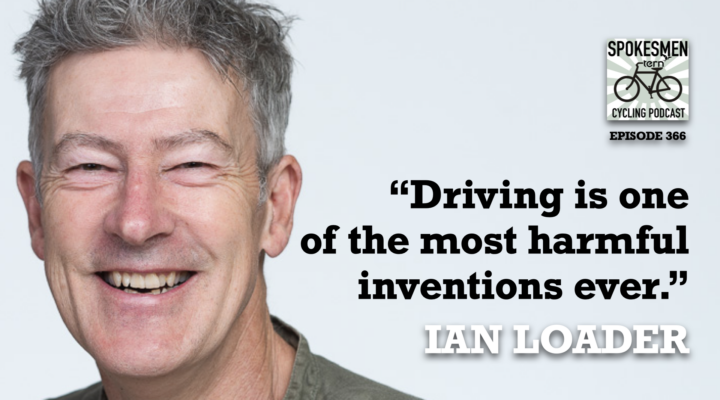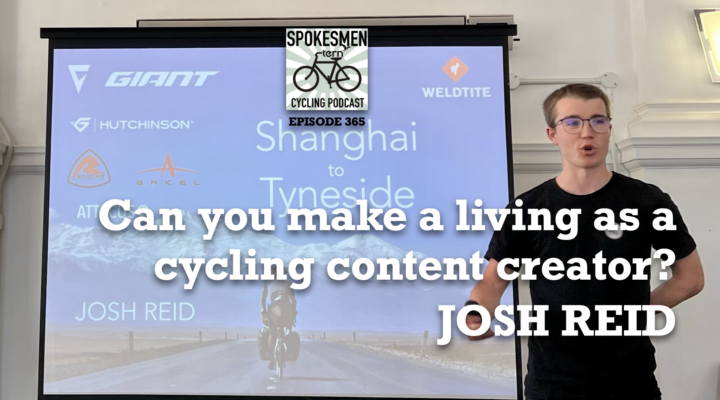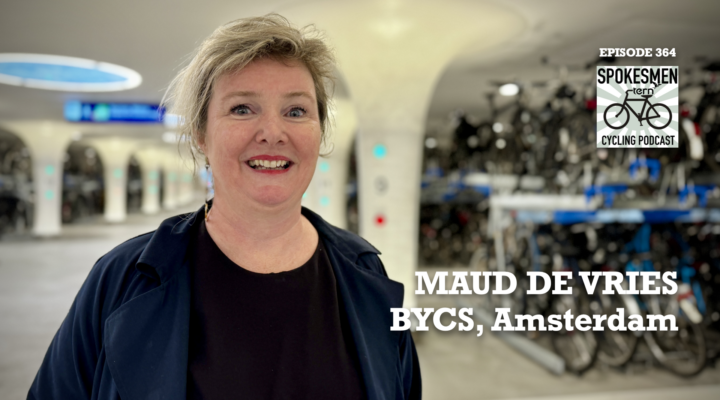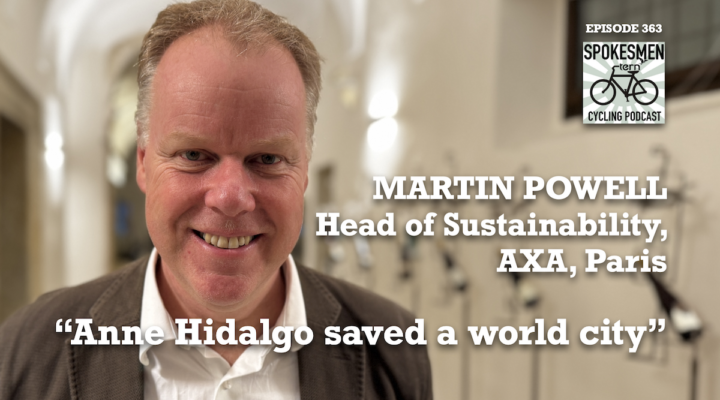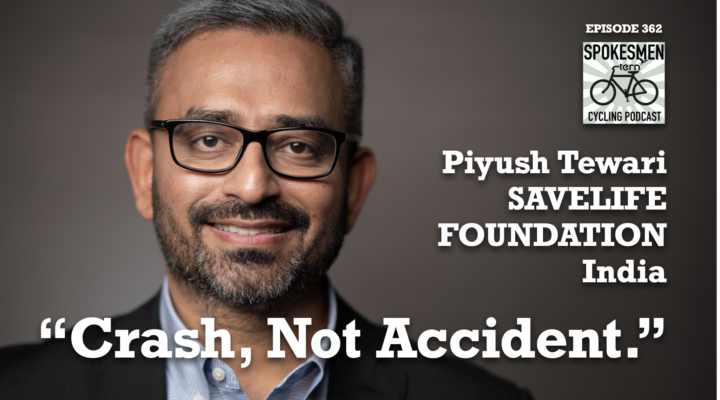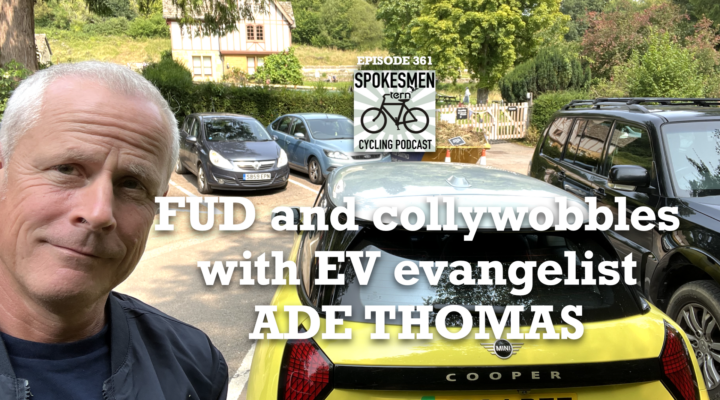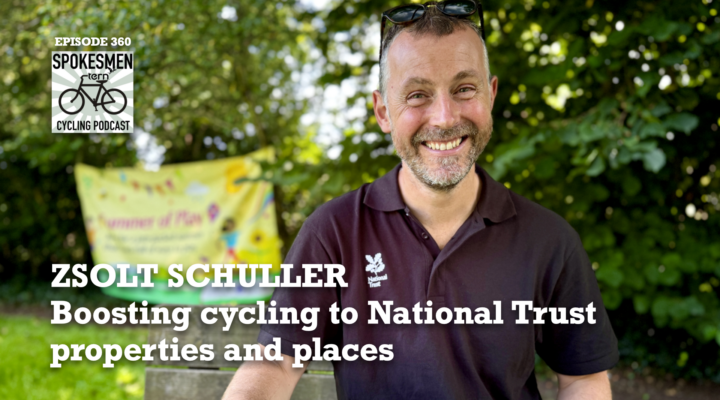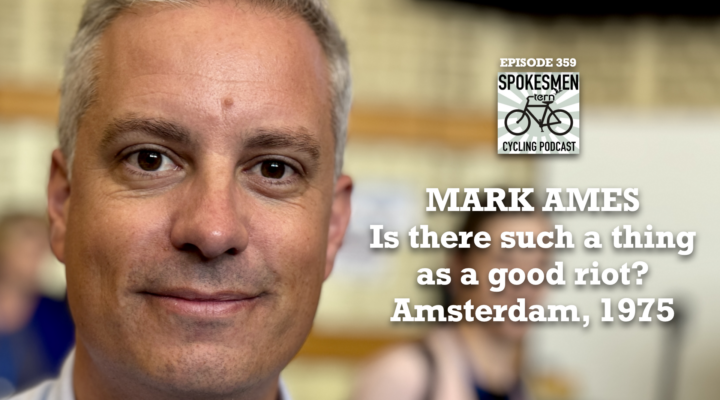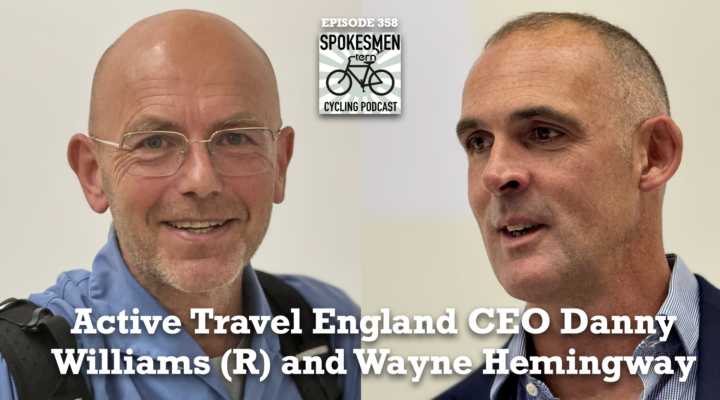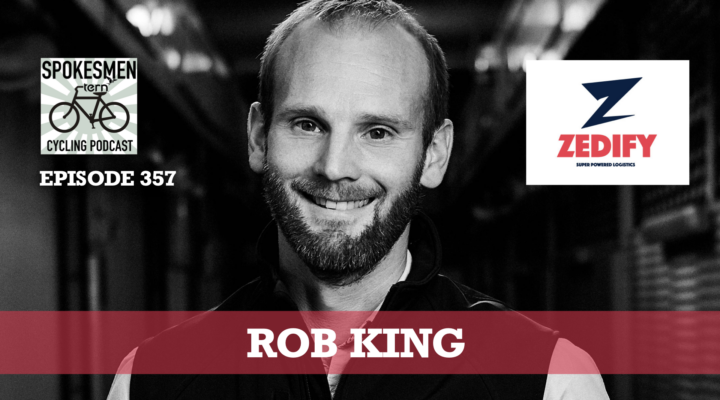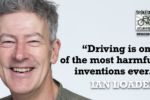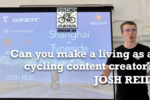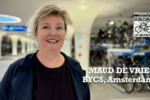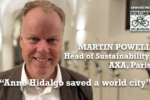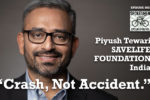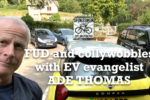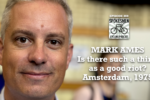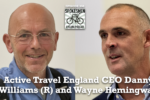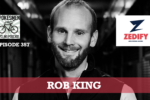7th July 2024
The Spokesmen Cycling Podcast
EPISODE 357: Rob King on A-to-Zedify
SPONSOR: Tern Bicycles
HOST: Carlton Reid
GUEST: Rob King
TRANSCRIPT
Carlton Reid 0:12
Welcome to Episode 357 of the spokesmen podcast. This show was engineered on Sunday seventh of July 2024.
David Bernstein 0:28
the spokesmen cycling roundtable podcast is brought to you by Tern bicycles. The good people at Tern are committed to building bikes that are useful enough to ride every day, and dependable enough to carry the people you love. In other words, they make the kind of bikes that they want to ride. Tern has e bikes for every type of rider. Whether you’re commuting, taking your kids to school or even carrying another adult, visit www.ternbicycles.com. That’s t e r n bicycles.com to learn more.
Carlton Reid 1:03
Hi there. I’m Carlton Reid. And on today’s show, I talk with Rob King founder in 2018, of zoom edify the Cambridge based e cargo bike delivery service is expanding. Again, it has just raised a further 4 million pounds on top of 6 million pounds it raised last year, with corporate finances clocking that the company claims a 13% improvement in logistical efficiency compared to vans. Now that might not sound like much. But it’s in a sector that has over many years sweated the details on logistics efficiency, and assumed there was nothing left to squeeze out. See if you’ve had been to investment so so tell us about that. And tell us about the spread of investment over the years.
Rob King 2:00
Yes, so great news for us. We got another 4 million pounds. That’s taken our investment now to 10 million pounds in total. And the great news is the investor that we have got have got tons of confidence in us because they’ve come back for more, which is brilliant. And they like what they’re seeing and all the impact stuff that we’re doing. So yeah, it started. I think it was 2019 or 2020. Actually green Angel ventures, we thought we could change the world with 300,000 pounds, reasonably quickly realized we probably couldn’t do it that and so our funding rounds, we’ve gotten a little bit larger each time. And yeah, now we’ve got some really good institutional investors on board, including Barclays, we’ve got an impact capital fund and Mercia who is sort of generalist VC from the Midlands.
Carlton Reid 2:45
So when you say it’s good news, so you’ve got the money to invest, but you then you’re giving away parts of your business, as well. So how does that operate?
Rob King 1 2:55
Well, sort of standard thing, people don’t give you money for nothing, I suppose. So it’s always a bit of a bit of a deal a bit of a trade off. But I think if you if you want to grow and you want to change the world, then you need some resources to do that. And this is what probably what I got a little bit wrong. Four or five years ago, when I thought I could change the world for not very much. And you know, certify is all about, you know, wanting to create the biggest impact. And if you want to have do stuff at scale, you do need to put put some cash into it. And that comes a bit of a price. But I think the most important thing is that, you know, we’re doing some good stuff in cities and change the way deliveries are done, because they’ve been done in the same way for many, many, many, many years. And something’s got to change. Tell me about
Carlton Reid 3:40
that then. So what banks do you use and talking about your fleet?
Rob King 1 3:46
Well, maybe first of all, just to sort of talk a little bit about the problem and what where where Logistics is right now. Because the way I see it, you know, if you if you think about an every or yodel a typical big logistics hub miles outside of a city and they’ll load up in the morning, their vans and trucks. And whilst they’ll zoom down the motorway. As soon as they hit that city environment, they find they get caught up in congestion and can’t find parking. And nobody really wants to idling diesel van on their street. And that’s the problem. They’re using the same vehicles that are really good on in a motorway environment, but really aren’t performing particularly well in a city environment, and particularly modern city that wants to be all nice and livable. So our model is around utilizing micro hubs. And that means we can use these really cool, fantastic electric cargo bikes and we use really quite big ones. So about half the size of a small van, typically three or four wheels, but they can actually deliver a lot more than a van over the course of the day. So rather than one big long delivery route, our vehicles will go back and forth from that localized hub, perhaps up to four times in a day so can deliver more volume over that and obviously give our customers a much more flexible experience and if Also, the bit that excites me is the impact because that system can save more than 80% carbon than even an electric Van Fleet. So it’s really impactful. And you know, if we’re gonna get to net zero, we definitely can’t do that just by remaining to electric band,
Carlton Reid 5:14
You mentioned some of your competitors there. And then others do have similar, very, very small scale, but they have similar initiatives, you know, that UPS has got, you know, various branded electric bikes, etc. So why couldn’t those companies expand at scale and knock you out of the way?
Rob King 1 5:40
That’s a great question. Well, I think first of all, it’s a really exciting, and it’s a real rubber stamp, I think to what we’re doing in that hamazon. Every, you mentioned UPS doing this little bit, I think that’s about it. I think those are the big sort of carriers that are investing a little bit in cargo bikes, but they tend to be sort of tweaking around the edges, I’d say, mostly, I guess the bit that stand us apart is that it’s 100%. We are cargo bike first 98 odd percent of our fleet or cargo bikes, we do use the old electric van. And that means we can sell to our customers 100% service that is very, very, very low emission, I don’t think you can call it zero emission anymore, but certainly zero emission a tailpipe. And that, you know, you just couldn’t do that if you’re an Amazon or an every for at least probably not for 10 years, because it’s going to take them an awful long time. And as someone pointed out, I think it was, I think it was DPD, who were raving about the number of electric vans and their fleet, and I think they’re up in the hundreds now. But the overall impact in the year was that their carbon emissions had gone up, because although they put an extra 100 Electric vans on the road, they’d actually put another 200 non electric fans, they just happen to have grown quite a lot. So I think from a customer perspective, they they they would never be able to say, hey, customer, we can give you 100% Green service, we can say our 1% of our fleet, our cargo bikes are green. But it’ll be a long time before they get to that point, I think so, you know, the sell for us. And the customer proposition I think is much more powerful to probably the main difference what the last
Carlton Reid 7:16
the last mile delivery their model. But you’ve still got to get the stuff to that last mile hub. So in that chain, there’s there’s there’s polluting van, there’s something going on that behind the scenes to get to that hub. So how do you measure what you don’t see? In that there’s a lot of stuff that you’ve got to get to the to the hub with? Yeah,
Rob King 1 7:48
that’s another great question. And you know, we’d love it if we could just do the last mile. And when we talk to customers, you know, we’d love it if they just sent their parcels directly into our house. But the reality is, they want us to take ownership from their distribution hubs, which are in the Midlands, and we have to go there at midnight or not normally a half an hour before all after, pick it up and move it through the country to sortation hubs and then get it back out to our cities. And for that, we sometimes use electric vans, sometimes this stuff is so big, sort of 26 ton truck big to one of our cities every evening, that we just can’t use electric fit for all bits of it. What we can guarantee is that last mile piece, and then we use the best alternative that is out there. And sometimes, you know, you could say, well, we’ll put three electric the answer on that route, but actually that will be a lot more impactful than having one disempowered, larger vehicle on a per parcel rate. But I think it’s worth saying, you know, we’re here to solve one problem. I think there’s not many businesses that can, you know, solve more than one problem at a time, they’re gonna do one thing, one thing really, really well. And for us, it’s that last mile. And for the rest of it, we’re just using the best alternative that is out there at the moment and one day that might be electric trucks on mass. Or it might be rail or it might be bus, we use some bus operations for one of our sites down in Plymouth. We put that on a bus on a national express bus that’s got spare capacity in it, which is fantastic that we can utilize that. But yeah, I think it’s just about yeah, there’s there’s always reasons where you can say well, we’re not going to use you because you know, some parts of that supply chain isn’t perfect. Nothing I think in life is perfect. But what we are doing is is something an awful lot better than what is out there right now. And
Carlton Reid 9:43
is an all electric trike electric bike or do you have any like traditional bicycle careers, you know, on a Fixie going around with you know arm tattoos and and you know, rings through noses that kind of stuff. So So what are you operating?
Rob King 1 10:01
I get all sorts of visions in my head, because I used to do a bit of that in my time, but I don’t remember the tattoos particularly. So no, we don’t is the is the summary of that, when, when we first started doing stuff, we used to do anything we could possibly get our hands on on a bike. But the reality was, we had to focus on one thing, and the one area that is still growing massively, I think it’s a 10 billion pound business in the UK, there are in the average household orders, 200 items online, that is the bit that’s really growing. And that’s the bit that we can really make the biggest impact, the stuff that moves around by sort of cycle careers has been a bit of a dying trade, unfortunately, there’s just not very much going around like that.
Carlton Reid 10:42
So that was like pre emails will certainly print, you know, fax era where we, you know, art departments were sending, you know, small things by bicycle that’s that was that was the state of the stripe
proofs. And now,
Carlton Reid 10:57
you’ve got, you’ve got big things, and you can no longer do that with a courier with just a satchel on
Rob King 1 11:05
was not just the fact that they’re big things, we often do very, very small things, but it’s about competing in the marketplace, and doing things as efficiently as possible. So our, our calculators will typically go out with 50 100, maybe even more parcels in one of their bikes, and do a delivery round like that. And the marketplace is typically Well, you know, when you order something online, it’s, you rarely pay more than about three pounds for delivery. And that’s the expectation in the marketplace to get it from, you know, whatever that distribution here is right to your door. And there’s an awful lot to, you know, a lot of systems to go through. So you have to have a very, very, very efficient system for doing that. The other end of the scale that this sort of cycle through traditional cycle is a bit like the queue commerce or the delivery style stuff where it is all point to point you’ve got one rider delivering something from point A to point B, and they do the whole journey rather than the sort of multi drop stuff that we do, where we are delivering to kind of every street every other street kind of thing. So
Carlton Reid 12:08
the delivery model, I’m going to add the there’s a name Ernest Austin that they’ve got, they’ve got like a name for their, their, their algorithm that the way that they route riders around which which is kind of their magic sauce is what they say is, you know, this, this, what differentiates them, they can get riders very efficiently to where they want to deliver food or whatever. So are you operating something similar? You’ve got some secret sauce software, which is routing riders in the most efficient way possible and lacing through the city in certain ways? Or is there any autonomy?
Rob King 1 12:52
That’s a really good question. So yes, we have software that does, routes, that utilizes sits on top of a Google Maps route. And at the moment, you can pick a cycle route, or you can pick a van route. And unfortunately, there’s nothing in between that fits one of our vehicles, which are, you know, in between those two. And most of the time, we don’t want to be on a van route, because we’ll end up on a dual carriageway or something horrible, but often the cycle routes, get caught up with some guessing gates that we can’t get through or some inappropriate routes. So we are building some really cool machine learning really on top of all of that, whereby we got tons of amazing local knowledge in our riders who go and do these routes every day. And they look at the Google route and go, oh, I want to do that there’s a great little cut through their van route, which will make the use of a machine learning piece, we’ll take that route and compare it with the Google route. And if it’s quicker, better cleaner, learn that so that when the new writer goes out, they don’t have to have all that amazing local knowledge. And that, you know, starts building a whole load of data that drives efficiency. So it’s a bit like Waze than
Carlton Reid 14:05
in that. Exactly, exactly. And
Rob King 14:10
whoever, and it’s in real time as well. So yeah.
Carlton Reid 14:13
So just to explain that, I mean, a human goes through in a in ways as turned in a car, the algorithm picks that up, and it notices that lots of lots of motorists have gone through that route must be a good route. So then recommend it to other people. And then if there’s a blockage, it can like on recommend that route. So you’re you’re talking about something relatively similar, where there’s local knowledge, or there’s knowledge from a human, but then that’s picked up by an algorithm.
Rob King 1 14:39
Exactly, exactly. And then and then you can build on that model and put more and more complexity into it by feeding it data for example, from train journey times, you know, to make sure you don’t get stuck, a level crossing that kind of thing or whether you know, anything that will impact or affect that journey. Or if one of our riders gets to a A road, there’s a blockage there, they can they can, you know, put a put a, put a notification out and that will reroute all the other riders to make sure they don’t get caught up in traffic. So that’s got amazing impact in terms of efficiency, but it’s also got really good impact in terms of our customers and make sure we hit those time delivery slots that you you want. So
Carlton Reid 15:23
tell me about your expansion in terms of numbers of people. You’ve got now numbers of people you want in in, say, two years? And then also tell me who you’re looking for. What how do you when you’re interviewing riders, what are you asking? What what are their skill sets?
Rob King 1 15:45
Yeah, so we’ve got around 220 odd people in the team at the moment, across nine different cities. This year, we will be tripling in size, that’s number of parcels rather than people will probably double in in pupil size. And two years time, we’d hoped to be in around 20 or 30 UK cities and really started to ramp up a lot. But this isn’t unfortunately, a nice SAS business it is real operations are real people on the ground, and things don’t move normally quite as quickly. But they you know, we are growing and we’ll grow you know, very, very fast. In terms of the riders and who we look for. Mostly, it’s just around attitude, you don’t have to be super fit. These are all electric assisted vehicles, they’re set to pretty much output around 70 watts. So typically what you’ve managed to do over an eight hour day, so you get some fitness and a lot of the time you’re not on the bike, you’re often off the bike and delivering parcels and walking around as well. So it certainly you need to be fit in terms of normal fit, but you don’t need to be I’m a I’m an Ironman triathlete, this is part of my workout kind of thing. So I would say, You know what we’re talking about before the kind of cycle career a bit of it where you might have done 7080 Odd miles in a day and perhaps only done 10 deliveries, you know, each delivery being a really long journey, these are much more every other street every 100 yards, you’re stopping and making a delivery. So a certain level of fitness, but it’s kind of walking and gentle riding, rather than sort of fast paced zooming across town and whipping through the Trintech tech kind of style. And broadly attitudes. So we’ve got some really, really great riders who perhaps come to work with us for two or three days a week or afternoons, the rest of time perhaps are a freelance graphic designer or teacher. And this is part of their kind of wholesome, that’s get out and about meet people be out in the fresh air and get a bit of a health kick.
Carlton Reid 17:47
You don’t have to be like a full time employee you can not not the delivery model, but actually, is it similar? How, how are you taking those those part time people on?
Rob King 1 17:59
Yeah, so as I said before, like typically our rounds will won’t just be one big long round in a day. And they’ll typically be two, three or four rounds. So there might be three or four hours long. So they can work into different part time shifts quite nicely. And we worked seven days a week, typically from 7am to 9pm. So quite a broad range in time. So people can flex around what they want to do. We like regularity. It’s not like delivery where you can just pick up the app and you know, do it for a few evenings a week and then just stop for a few months and come back to it. It’s not that level of flexibility. But there is a community to it and a routine to it. And we started finishing at the at our on our micro hub. So there is a really good camaraderie around that.
Carlton Reid 18:49
At that point, I’ll stop Rob there, and we’ll go across to somebody new for a quick commercial break.
AI Charles 2 19:00
Hey, thanks, Carlton. I’m Charles. David. will be back next episode. Do you dread the ridiculously long pickup line after school? Are you struggling to keep your kids entertained on car trips? Driving can make you feel like you and your family are stuck in a one ton metal capsule — boring, stressful, adding to your eco guilt. The good folks at Tern want you to know there’s a better way to get around with your kids. It’s by bike and it’s easier than you think. The Tern Quick Haul Long is a smooth riding compact cargo bike that’s third party tested to safely haul up to 190 kilograms. Paired with Bosch’s powerful yet simple to operate eBIKE SYSTEM. It will help you carry two kids plus all their stuff, so transporting them around becomes easier than ever. You get to skip the school pickup line while your kids have fun engaging with the world around them. It’s a win win for everyone, as well as the environment, visit ternbicycles.com to learn more. Back to you, Carlton.
Carlton Reid 20:02
Thanks, Charles. And yes, David will be back. I hope in the next episode, he’s actually in all above the Arctic Circle, would you believe? Which is why we haven’t got him for this episode anyway, we are back with Rob King of Zedify. Now, obviously, you’re going with the green angle, and the you know, the clean angle. But also an mme, this is where the investments come from. But you can’t you can you can tell me that if this is true, it’s just pure efficiency. It is just daft to be taking a large four wheel vehicle a van through what are often congested city streets. And it’s just, it’s just, it’s just pure logistic intelligence to use a smaller vehicle. So yes, you’ve got the green element, but the end of the day, it’s just your data efficient? How do you how do you? How do you square those two things.
Rob King 1 20:59
So on the you know, we are we sell and we get in fall where companies on that green angle, but actually 99% of people, or businesses certainly wouldn’t choose you because you’re green, it’s something that they might wave around as a ticket and tell everyone. But actually, they will choose you because of your price and your service. So those two have got to be absolutely awesome. And for us to be price parity with the competition, it’s an extremely competitive market, then it has to be around efficiency. And we’re just a very different model to what’s out there at the moment. And although, you know, we have proven that we are at least 30% more efficient getting around the cities, with cargo bikes, sometimes it’s more, but at least that there are other challenges in that we have to have those microbes situated in the middle of cities are typically quite expensive cargo bikes typically have to be stored inside. Contrary to popular belief, there’s actually probably more costs in maintaining them than electric van, it’s certainly one of the unknowns. cargo bikes are very new industry, vans have been around for a very, very, very long time and have a whole load of infrastructure and ecosystem around it from insurance to finance to servicing, you know, you put it in for service once a year, you know, exactly the depreciation it’s gonna go through. And there is a model around hiring people that have a driving license for cargo boxes is pretty new and pretty different that whole ecosystem. So there are just different costs in the model. And what we’re proving out is, overall, you can make that work as an efficient system. And that’s what’s I guess, exciting our investors, not only that impact side of it, but actually it’s, it makes sense, it’s a good business, and is the future of how deliveries and cities will and should happen. And
Carlton Reid 22:47
let’s go back to that 13%. Because the story that I did on you previously, with Forbes, I married that to an earlier story, which was a Dutch report, which said, you know, cargo bike deliveries are X percent better, more efficient in cities, and it was Amsterdam, specifically on this particular study than than vans. So you’ve got something similar, you’ve got a 13% figure. So where does that 13% figure come from? We
Rob King 1 23:17
just did some comparison with a van courier company. And, yeah, we just shared some data with them in terms of what a typical van crew could do. And then what we were doing on the ground, with the same number of parcels against the same location. So you know, essentially a direct comparison for that last mile. But what it doesn’t show, as we’re talking about before, is then all of those other costs and how that system works, and fits in. And to get to the sort of scales where you get some really awesome economies of scale, particularly in that kind of trunking piece. You know, we are competing with the likes of every deputy and yodel who are doing things in millions a day, and we’re doing things in, you know, 1000s of days. So that’s the challenge. And that’s where, you know, the the investment, I guess, is, is required to have confidence to go forward and say, Yeah, this is this is the future of it, as you said, it makes complete sense, on all sorts of different levels.
Carlton Reid 24:15
Because that, forgive me, but 13% more efficient, to I don’t know, maybe a logistics person that’s like, oh, that’s, that’s the Holy Grail. That’s amazing. You know, we work on, you know, fractions of 1% efficiency. But to me personally, as a layperson, that doesn’t seem that great, you’d think, oh, electric bikes, you know, through going through it, and it’s been much more efficient than vans. So tell me why I’m wrong. Why, why is 13% really good?
Rob King 1 24:43
Yeah, I mean, it’s a game of marginal gains. But this is comparing, like a super optimized model, or existing super optimized model with those number of parcels. So, really, the differences you know, you’re not you’re not sure versing milk, you know, all the way across the city like you might do it, you say on a on a career bike on a fixed kit bike with your tattoo, and trying to cover seven miles for one job, which you can do in you know, maybe that’s 5060 80% more efficient than, than a car or a van. Whereas this is in a very, very concentrated area, perhaps you’re delivering 50 to 100 parcels in a square kilometer. So really, the efficiency gains a little bit about getting there and that stem mileage, but once you’re there, which is really the study we did once you were there not so taking out some of that stem mileage stuff. You know, how many parcels you can deliver over the course of that day. And really, the advantages, the main advantage is really is about parking and be able to stop and get out your vehicle really quickly and where that’s situated. And then a little bit in terms of utilizing some of the cycle infrastructure and cut throughs depending on where you are. And that can change quite a lot, depending on the city and some of the filter permeability stuff that’s, that’s coming up. And I guess that’s where we see the future is this is only going in one direction, if cities want to make their places nicer for people to live, and be then those sorts of cut throughs are going to be, you know, changed, and there’s gonna be more costly that it’s gonna be harder and harder to get round in vehicles that aren’t as safe and noisier and aren’t as positive for for the city environment.
Carlton Reid 26:24
Rob, get us you say it’s only going one direction. And I kind of agree, you know, if you look at it, this from a purely macro point of view over a great deal of time, but at a micro level, and it’s it’s kind of been brought into the culture wars sphere, with the current political campaign. In fact, in that it’s not going that way. There’s been a lot of kickback against for instance, like low low traffic neighborhoods, and so low traffic neighborhoods are good for you. Bad for vans. So why do you say it’s going in one direction? And do you see that culture war thing, in effect, stopping because we’re recording this today, the general election in the UK, and it’ll flip, you know, with the Ed Miliband promise of everything goes green and new investment, etc, etc. That culture war switch is turned off tomorrow?
Rob King 1 27:26
Yeah, I think this is actually sadly, I think, a failure of our politicians and leaders to explain this well enough because no one wants to kill off their electorate, and everyone’s cleaner streets that are safer and time and again, when these things have been put in place. And there’s been a relatively small minority that are very vocal against whatever it is. And when they turned around at the end of it and said, Oh, do you want us to take it back to what it was? Most of the time? People were like, no, no, no, we’re actually quite happy about this. Thank you very much. So I think I think there’s an inevitability to this. And people don’t like change, people don’t like having choices taken away from them, is the reality. I think, I mean, I’m not a, I’m not a traffic planner. But I kind of feel like that will be the long term trend once, once you get through some of the policies of stuff and want some of that communication is is better, because I think that has been very poor. And we, we seem to talk a lot about all these things that we’ve been deprived of, and I can’t drive my car, and we talk less about the real benefits. And, and why this is good. And have that vision for what the endpoint is. And think about all the opposite of rather than all those obstacles in the way of like, Oh, but I can’t do what I used to do yesterday. So it does, I think need a bit of imagination, better communication. But it’s definitely only going in one direction, because it’s the future our cities. And this has been a general move, albeit slowly, I think in that direction. So
Carlton Reid 28:54
tell me where you start because you start off in Cambridge. So Cambridge is a kind of a different city. And it’s like it’s it’s medieval, it’s narrow streets. And yet you’ve got other cities, I can’t name them, where it’s not like that. And you know, they maybe they were bombed in Second World War, and they were flattened and completely redesigned, basically in effect for for motor vehicles. So how did you take a Cambridge model and and put it into a city that isn’t anything like Cambridge?
Rob King 1 29:32
Yes, sir. That’s a really good question. And honestly, I think we have been a little bit challenged in some of the cities we’ve worked in because our model is based on three to four mile radius from one of our logistics hubs as a perfect stem mileage and when you go into a big city like a London, you obviously can’t service the whole of London with one habit. It requires many multiples of hubs and then you’ve got an extra challenge of trying to provide a service that covers the whole of London at seamless But with multiple hubs and all the nuances around moving stuff between hubs. So I think that’s been a big challenge for us. And most of our competitors, typically electric bands, starting in some of the largest cities like London, they go almost like London, and then there’s not very much like London, whereas, you know, we got to work here in Cambridge, actually, there’s quite a lot of cities like Cambridge, you’re in Brighton and, you know, old school streets that are designed around the horse and cart. They’re actually pretty hard to get around in vans. But But that said, it’s also a lot of the modern cities and Manchester is a really good example where, you know, the cycle infrastructure that is going in is really, really helpful and makes it easier to get around that some of the filter permeability, stuff that’s been put in has been really excellent for us. I think it could be better. But
Carlton Reid 30:49
yeah, it’s
Rob King 1 30:50
been challenging, but I think you know, all cities will certainly have areas and locations that are still much much easier to get around on on a cargo bike and a small vehicle, even if they have been designed around a car more. And that’s just a factor of congestion as much as anything.
Carlton Reid 31:06
I was in Walthamstow recently. So obviously London is a is a city of multiple villages is the standard way of describing you know, that kind of that hub and spoke model for for London as a whole. But as in Walthamstow. And I’ve gone back there, you know, every few years. But when I went back this time, there was just an explosion, in maybe some of them was edify, an explosion of electric cargo bikes, and they were coming past. You know, when I stopped when I was taking photographs, you know, they came past every minute. It was it was, you know, that many cargo bikes. So is the Walthamstow model, something that you’re plugging into? And and that’s where you really shine?
Rob King 1 32:01
Yeah, absolutely. And I think that’s a good example where politicians have stuck their neck out, and all thought they weren’t going to get reelected once they put all this infrastructure in and really helped to create a completely different environment for people to walk and cycle more easily. And it’s been really transformational. And I think most people who live in that area wouldn’t want to go back I’m sure there’s still pretty strong local, but but minority loud voices against it. But absolutely, because it makes it much easier to get on. On cargo bikes, it really supports what we do. And actually, we had quite a good example from one of our clients in London where they, we did a trial with them. And we knew that we were faster and more efficient on the last mile. But with all the reloading and all the extra complications, it just didn’t quite work out for them, though, like it’s just a little bit more expensive and can still get around pretty easily. And overall, it just makes a bit more sense. And then they made a few of the streets, proper zero emission, and they stuck in and made it harder for you just to go through all sorts of cut throughs. And suddenly their van journeys that were half an hour was suddenly becoming at 90 minutes. And suddenly the economics just changed overnight. And they came back and was like actually, no, it does work. Thanks very much. So I think my, my, my call, I suppose to local authorities is set the parameters of how and that vision of how you want that local area to look and then allow businesses to do what they do best, which is find innovative ways to still do all the things that you needed to do, whether it was getting to school easily or delivering parcels, they will come up with solutions that fit within that framework.
Carlton Reid 33:41
And let’s go back to your press release. So this is this is your PR person sent this to me piqued my interest. Let’s Let’s talk. So can I do an audio version of that press release? So tell us that well, just saying read out the press release. But what was that press release about so people can understand exactly who you’ve got investment from and what you can be doing with it?
Rob King 1 34:11
Yeah, so it was just sharing the news, I suppose that our investors, our current investors, have confidence in us and want us to grow and keep doing the good stuff that we’re doing as well as grow into more cities. So we got 4 million pounds from Barclays impact capital from Mercia from Green Angel ventures, group of Angel ventures, as well as support from the British business bank. And that will allow us to continue the good work that we’re currently doing and expand our operations as well as open a new hub in the Midlands. We’ve left a little bit of a just because it’ll almost certainly be brilliant, but it might, it might be not. We just forget the data at the moment and Lappish like we’re talking about just now about this see the cities and the dynamics of it and how easy it is to get around on a cargo bike and where our customers are. So we’re just analyzing all of that data. But we’ll be there will be there by the autumn of this year and in a few months time,
Carlton Reid 35:12
Thnaks to Rob King there and thanks to you for listening to Episode 357 of the spokesman podcast brought to you in association with Tern bicycles. Shownotes and more can be found at the-spokesmen.com The next episode will be later this month, meanwhile, get out there and ride …
